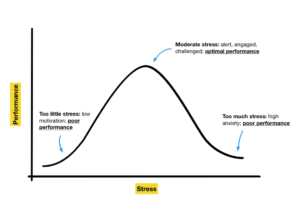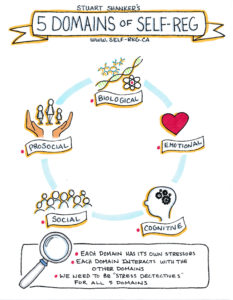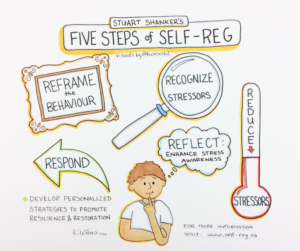Partner Stress Series Part 2
In part 1 of our stress series, we discussed what stress is and how it relates to hearing loss and tinnitus. Off the top of your head, I’m sure you could come up with several strategies to reduce some of the stress caused by those. However, the most important thing about these strategies is their ability to regulate stress in a consistent way. This is where self-regulation and partner stress (or your own) comes in.
Self-Regulation
Dr. Stuart Shanker has created a framework for life and stress called Self-Regulation (or Self-Reg). Dr. Shanker is not the first to use this term, but his particular perspective on how it can affect our lives is unique. Self-reg is not self-control or stress management; it’s a way of looking at stress and working out the root cause rather than just trying to control or manage the behaviour.
So what is Self-Reg?
Mindful self-reg involves learning to recognize and respond to stress in our environments to bring ourselves back to homeostasis (balance or calm). It’s about…
- exploring and testing out the ways in which relationships, environments, routines, and activities can enhance self-regulation
- recognizing stress behaviour (behaviour that is reactive or caused by excessive stress)
- noticing subtle signs of stress behaviour that we never saw or understood before
- finding our own self-reg so we can help those around us learn how to regulate themselves in the same way
We do this by understanding there is positive and negative stress. Stress is on a curve…

We need a moderate amount of stress to be productive.
With too little stress we are unmotivated, falling asleep, and easily distracted.
On the flip side, too much stress causes our bodies to go into fight (frustration, anger, etc.), flight (running away, inability to concentrate on a task), or freeze (which can look like compliance).
So what do we do with too much stress? How do we use self-reg to bring us back to calm?
Self-Reg Perspective
Dr. Shanker’s self-reg walks you through a process using 5 areas that stress can occur. These are the 5 domains: 
- Biological – anything affecting your body (including hearing loss)
- Emotional – feelings or situations that evoke feelings
- Cognitive – thoughts, brain processes, attention…
- Social – relationships within your social community (parents, friends, family, co-workers, etc.) and other social interactions
- Prosocial – how we expect social engagement and react to others
There are lots of stressors in each domain and they can vary from person to person. For a more detailed list of stressors in each domain click here.
Self-Reg wants to look at what are the stressors, how are they affecting the individual, and how to reduce the stress. This is accomplished through 5 steps…
*Note: These steps are not all the time linear. It’s more of a process that can jump back and forth as you continue to discover stressors in your life.
Five Steps
 Reframe the behaviour – Why is this behaviour happening? More often than not it’s because of stress.
Reframe the behaviour – Why is this behaviour happening? More often than not it’s because of stress.- Recognize the stressors (across the five domains) – What things are causing too much stress?
- Reduce the stress – what reduces your stress? What makes you feel calm?
- Reflect: enhance stress awareness – Figuring out how you feel when those stressors start, what calm feels like, etc.
- Respond: restore your energy – Develop personalized strategies to promote resilience and restoration
Self-Regulation and Your Partner’s Hearing Loss Stress
Self-reg is for everyone – regardless of their age, profession, etc. So it can really be applied to anything; it’s a way to look at life. In regards to hearing loss, there are a few ways this perspective can shift our thinking. Walkthrough the example with your partner (these are just a few possibilities; everyone is different). You can do this along with them to work in the stress in your life too.
Stressors (Example)
| Biological | Expending a lot of energy trying to listen Tired Headaches Earaches Balance issues Sweating Heart beats faster Suddenly cold Hearing loss Aging |
| Emotional | Feeling alone Feeling left out or unwelcome Depression Embarrassment Getting frustrated Irritated Agitated Sad Fearful |
| Cognitive | Not feeling engaged in the conversation Responding inappropriately in conversation Hard to focus Har to problem solve Guessing what someone is saying Words come out wrong |
| Social | Being left out Overwhelmed in large groups/crowds Public speaking Trying to have your turn in a conversation Two or more people talking at once People talking too loud thinking it will help People not looking at you when they are talking |
| Prosocial | Dealing with other’s responses to your hearing or lack of engagement Feeling unprepared Expectations of others (for them and those they put on you) Feeling like people are talking about you Feeling self-conscious reminding people to talk louder Taking it personal-hearing loss your fault somehow |
Any other stressors specific to your partner?
Self-Reg Steps (Example)
| Step | Questions to Ask | Example |
| Situation | I don’t like socializing in a group | |
| Reframe | Am I feeling isolated? Am I avoiding social interactions? Do I get frustrated in conversation? | Groups are stressful because it’s hard for me to hear |
| Recognize | Is my hearing loss causing stress? What other stressors are affecting me right now? | This is where the domains come in! (see above) |
| Reduce | What or when do I feel calm? What helps reduce my stress in the moment? | Find a quiet place to talk with someone Socialize in smaller groups Asking music to be turned down in a restaurant, coffee shop, etc. Hearing Aids or other devices Having a good communication partner with me to be my advocate Ask my friends ahead of time to make sure to have my attention before speaking Give myself breaks if I need it (okay to step away from the table for a minute) Advocate for myself in the moment “could you please slow down and repeat” |
| Reflect | Can I feel my stress rising? When? How? Did the strategy help a little bit, a lot? Do I feel calmer physically, emotionally, and cognitively? | [Notice how you feel before and after trying out a strategy] |
| Respond | When stress happens what can I do in the moment to help? How can I prepare for when that stress comes up in the future? What gives you energy? What can you do to build resilience and support your wellbeing? | Get adequate sleep Give yourself a reward for socializing in a group[ Do an activity you like before and after being in a group |
In these situations…
- How can you be supporting your partner?
- Do you notice other stress behaviours that can alert yourself or them?
- What can you do to advocate for them when they are in a stress cycle?
- Is there anything you can do to help them feel calm?
Self-Reg for Tinnitus
If your partner also has Tinnitus, stress is a major trigger. In order to understand why stress increases tinnitus, we have to look at where the stress is coming from and break it down into its individual components or stressors.
Stressors (Example)
| Domains | Stressors or Tinnitus Triggers |
| Biological | Tinnitus Fatigue Low energy Sharp sounds – dishes clanking, motors running Diet – high sugar, salt, caffeine, alcohol etc. For more info on how diet affects Tinnitus check out our blog here. |
| Emotional | Loneliness Helplessness Depression Frustration |
| Cognitive | Extra focus needed to do a task Mental fog |
| Social | Large groups Lots of noise |
| Prosocial | Expectations you feel from family and friends Others around you not understanding your situation |
Now that you’ve got an idea of some of your stressors, let’s look at how to reduce the stress…
Self-reg Steps (Example)
| Step | Questions to Ask | Example |
| Reframe | How does your tinnitus affect you? | I’m having a tinnitus flare up and can’t seem to do very much at the moment |
| Recognize | What has changed that might be causing me stress/tinnitus flare-up? | This is where the 5 domains come in! (See above) |
| Reduce | What or when do I feel calm? What helps reduce my stress in the moment? When is my tinnitus low? | On good days I feel rested (slept well) Being in nature is calming Distracting myself can help bring it down (I like playing CandyCrush) Listening to soft music |
| Reflect | Can I feel my stress rising? When? How? What are the early signs of a flare-up? | This could include tracking your tinnitus over the next few days or weeks
|
| Respond | When stress/flare-up happens what can I do in the moment to help? What can I do to prepare for when that stress/flare-up comes up in the future? What gives you energy? | Have music on my phone when out in public and listen to music at night to help me fall asleep Play CandyCrush when I need to distract myself Plan to go to more quiet events with family and friends Go for a walk in nature Be conscious of my diet during the day and look into alternatives for things that increase my tinnitus (i.e. tomatoes before bed) |
Although it can be hard to understand what your partner is going through when they have a Tinnitus flare-up, looking at their stressors and discussing their experiences, do you have a better understanding?
Is there anything you can be doing to support them, to calm them, or advocate for them when they are having a flare-up?
Homework
Work with your partner as they make a list of their stressors using the domains and the steps. You can use this Profile tool to help guide you through. Listen to their experiences and feelings, add your own observations, and discuss how you can work together to reduce the stress.
This takes time, so don’t rush it, dig deep, and use this time to learn more about your partner and even yourself.
Conclusion
We hope this information provides you with a new perspective to look at your partner’s stress, their hearing loss/tinnitus, and life stress in general. Our lives are filled with so much stress, having effective ways to look at it, talk about it, and bring ourselves back to calm is crucial.
Additional Resources
For more information on hearing loss don’t hesitate to contact us at www.TheEarDepot.com or call 705-749-0707.
If you’re interested in learning more about Dr. Shanker’s Self-Regulation, check out their website www.self-reg.ca
Lighten the Stress In the Moment
*Note: Taylor is a Self-Reg Champion through The MEHRIT Centre and works on staff in their e-school department.
 Reframe the behaviour – Why is this behaviour happening? More often than not it’s because of stress.
Reframe the behaviour – Why is this behaviour happening? More often than not it’s because of stress.


Recent Comments